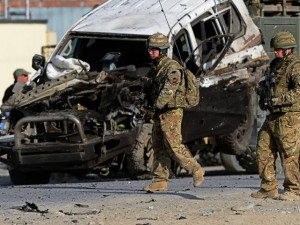Latest News
US intelligence reveals Iran’s connection to deaths of 500 U.S. troops in Iraq, Afghanistan
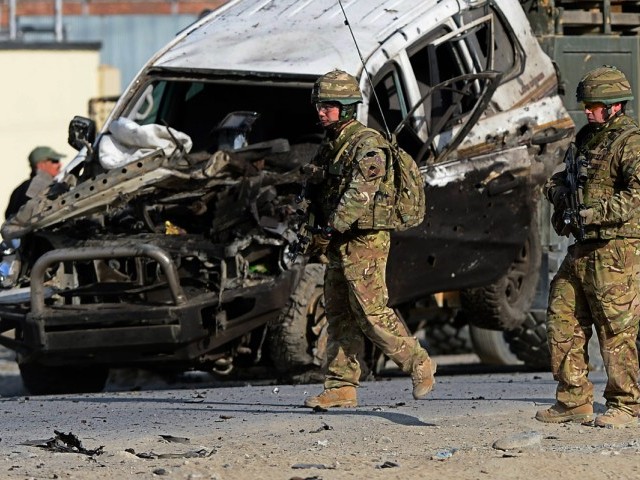
The United States intelligence reveals that At least 500 U.S. military deaths in Iraq and Afghanistan were directly linked to Iran and its support for anti-American militants.
According to Military Times, the figure underscores the controversy surrounding Washington’s deal with Tehran, a long-sought goal for the president — but one that is fiercely opposed by many Republicans in Congress and other critics.
The Military Times has written that many of those estimated 500 deaths occurred during the so-called surge in Iraq, when President George W. Bush ordered an influx of tens of thousands of troops to confront what had devolved into a sectarian civil war. Scores of American personnel were killed or maimed by highly lethal bombs, known as explosively formed penetrators, or EFPs, that Iran manufactured and supplied to Shiite militias across the border in Iraq. Many EFPs were powerful enough to destroy U.S. humvees and breach tank hulls.
The startling number emerged last week as Sen. Tom Cotton, an Arkansas Republican and Army veteran who served as an infantry officer in Iraq and Afghanistan, pressed the issue at a confirmation hearing for Marine Corps Gen. Joseph Dunford, who is Obama’s nominee to be chairman of the Joint Chiefs of Staff.
“Senator,” Dunford responded, “I know the total number of soldiers, sailors, airmen and Marines that were killed by Iranian activities, and the number has been recently quoted as about 500. We weren’t always able to attribute the casualties we had to Iranian activity, although many times we suspected it was Iranian activity even though we didn’t necessarily have the forensics to support that.”
The Defense Department does not specifically track casualties linked to Iran. The 500 estimate is a ballpark figure based on intelligence assessments, according to a Pentagon official familiar with Dunford’s remarks.
The memory of those deaths was surely a factor in the caution signaled by the Pentagon on Tuesday afternoon, after Obama’s announcement of this landmark deal between Iran, the U.S. and five other countries.
“As we implement this historic agreement, deterrence remains a major component of America’s national security,” Defense Secretary Ash Carter said in a statement. The U.S. military will remain ready to “check Iranian malign influence” and “utilize the military option if necessary,” he added.
The Iranian-made EFPs first appeared in Iraq in 2005 and for years were the most lethal weapon that American troops faced during the eight-year Iraq war.
Unlike the typical improvised explosive devices U.S. troops encountered there, the EFPs used more sophisticated technology and required more skilled milling to produce. Also known as “shaped” explosives, they used curved copper plates to direct or “shape” the bomb blast.
The estimate of 500 American deaths is probably on the low side, said David “Bo” Bolgiano, a retired Army Special Forces officer who deployed to Iraq in 2006 and 2007 with the Joint Improvised Explosive Device Defeat Organization, an organization created by the Pentagon to rapidly address the number of casualties inflicted by roadside bombs and other IEDs.
“It’s very difficult to quantify because, when you have an IED explosion that occurs in theater, you’d have to connect the dots and say, ‘Well, we have three U.S. casualties tied to that IED,’ and then that IED is tied to a specific copper-plated EFP from Iran. Often times, those forensics are missing,” Bolgiano said in an interview.
“The big EFPs from Iran were fairly easy to identify because of the metallurgy involved and the copper plate formation,” he said. “We had beyond-a-reasonable-doubt proof that Iran was the main supplier of the copper-plate EFPs,” said Bolgiano.
Troops referred to them as “IEDs,” but that’s not completely accurate, Bolgiano said.
“Improvised is a little bit misleading because it makes it sound like a basement bomb-maker, and that was not the case. The shaped charges, the copper plates, the components were anything but unsophisticated. They were designed and at the level anything that any other non-Western government would have,” Bolgiano said.
Cotton contends that number is much greater than 500, with still more American troops wounded in action as a result of Iran’s influence on U.S. adversaries in both war zones.
A spokeswoman for the senator, Caroline Rabbit, said Tuesday that Iran “has the blood of hundreds of Americans on its hands and this deal only gives them billions of dollars to continue killing Americans.” She was unable to provide Military Times with a more-detailed breakdown of those statistics, nor was the Pentagon.
American troops pulled out of Iraq in 2011 and returned last year as the Islamic State group overran Iraqi forces in places U.S. troops fought and died to liberate. In the eyes of many Iraq War veterans, to include some senior U.S. military officials, the Iraqi Shiite militias with links to Iran also have American blood on their hands.
In March, the top U.S. commander in the Middle East said he hoped the strategy for defeating Islamic State extremists will not involve an alliance with those groups.
“Three tours in Iraq commanding troops who were brutalized by some of these Shia militias … I will not — and I hope we never — coordinate or cooperate with the Shia militias,” Army Gen. Lloyd Austin, chief of U.S. Central Command, told the Senate Armed Services Committee last winter.
But after the demoralizing fall of the city of Ramadi in May, the U.S. military shifted its policy. Now, U.S. warplanes are launching airstrikes in support of some Shiite militias fighting the Islamic State under the command and control of the Iraqi government.
Dunford, who pending confirmation will become only the second Marine to serve as the U.S. military’s top officer, referred to Iran as a “malign force,” telling lawmakers that, despite a nuclear agreement, Iran will continue to exert its influence across the Middle East. One need look no farther than the Red Sea, where this past spring American naval vessels moved to block an Iranian arms shipment bound for rebel forces fighting the American-backed government in Yemen.
“If confirmed as the chairman,” Dunford said, “I’ll make sure that our leadership has a full range of military options to deal with Iranian activity.”
In a statement, Cotton indicated he believes the deal with Iran is a mistake, principally because it comes with an infusion of “tens of billions of dollars to finance its sponsorship of terrorism against the United States and our allies.”
“When I was a platoon leader in Iraq, my soldiers and I faced deadly roadside bombs, made and supplied by Iran,” the statement read. “I tried to reassure them, but I could only tell them to hope it wasn’t our day to die by Iran’s roadside bombs. If Iran obtains a nuclear weapon, I fear the United States will only be able to hope it isn’t our day to die by an Iranian nuclear bomb.” (Military Times)

Latest News
Regional developments require Afghanistan, China’s full coordination to protect interests: Muttaqi
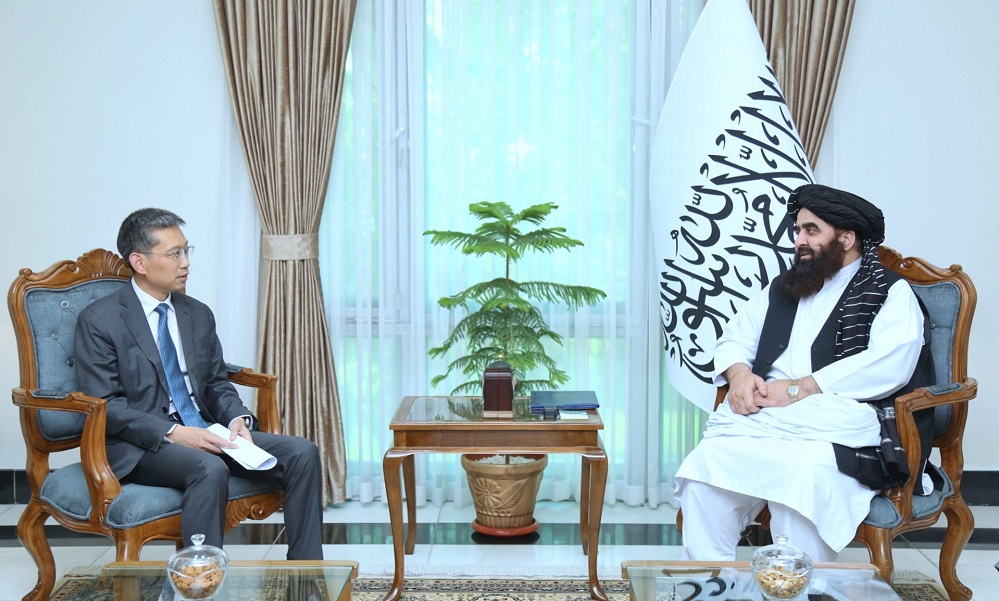
Acting Minister of Foreign Affairs Amir Khan Muttaqi has said that recent events and developments in the region require that Afghanistan and China continue their cooperation in full coordination so that they can protect their common interests.
Muttaqi stated this in a meeting with the Chinese ambassador in Kabul Zhao Xing.
The Ministry of Foreign Affairs said in a statement Tuesday that the two sides discussed bilateral political, economic and cultural cooperation between Afghanistan and China and the recent developments in the region.
Muttaqi expressed his satisfaction with the expansion of political, economic and cultural relations between the two countries and said that the Islamic Emirate has created good opportunities in the field of trade and investment.
He pointed out that the increase in the export of pine nuts to China and the progress in the Mes Aynak and Wakhan Corridor projects are clear examples of this policy of the Islamic Emirate.
According to the Ministry of Foreign Affairs’ statement, the Chinese ambassador considered the developments in various fields with Afghanistan as positive and added that he seeks to encourage Chinese businessmen and investors to play their role for long-term economic cooperation with Afghanistan.
He also said that his country is considering ways of bilateral cooperation and resources regarding Wakhan Corridor.
Latest News
Rashid Khan named AWCC’s brand ambassador
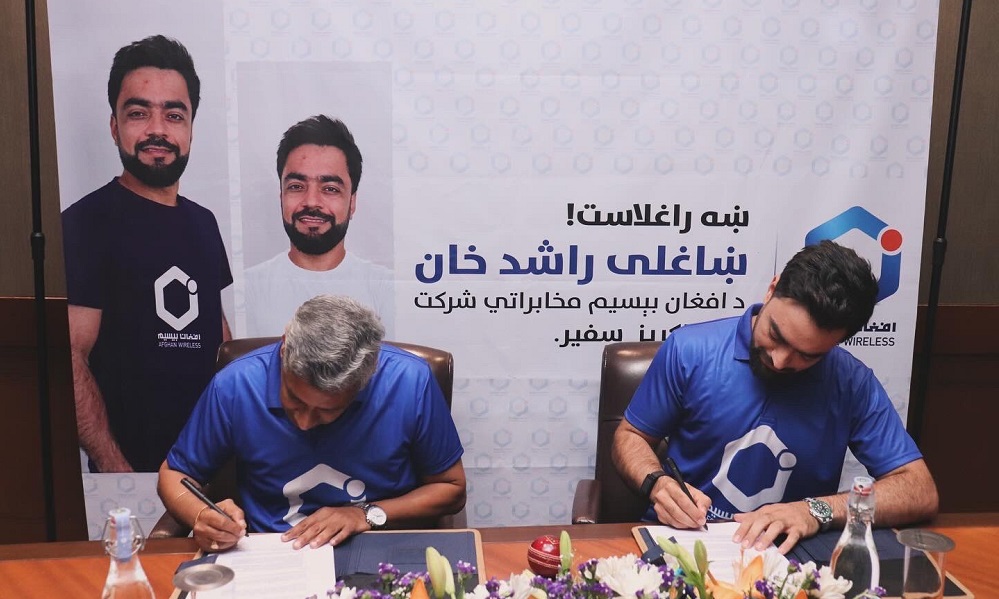
Afghanistan’s cricket superstar Rashid Khan has joined Afghan Wireless Communication Company (AWCC) as its exclusive brand ambassador.
“Rashid Khan is a young and prominent personality of the country who has shone brilliantly in cricket and in his social life,” AWCC said in a statement.
Rashid said he was thrilled to join AWCC as its brand ambassador.
“This is a great brand that I have always believed in and AWCC has been a front runner in the digital possibilities materializing in the country,” Khan said on X.
“Together I hope that we help more people to connect, encourage people to learn more and further utilize their talents and share their experiences more widely.”
What makes Rashid great!
Rashid Khan was Afghanistan’s first global superstar, and the key to the team’s successes in their early years in international cricket.
ESPNcricinfo experts say his extraordinarily effective leg spin has made him one of the greatest T20 bowlers ever, and among the first names on wish lists of teams in leagues all around the world.
Not a big turner of the ball, he puts batters under pressure with his speed through the air, like his bowling idol Shahid Afridi, while maintaining a stump-to-stump line. His biggest weapon is an accurate googly, and he has many variations. With bat in hand he is more than capable of clearing the boundary late in an innings, and he has airbrushed many a middling total into a match-winning one for his team, ESPNcricinfo states.
Rashid was just 17 when he made his ODI debut during Afghanistan’s tour of Zimbabwe in October 2015. Less than two years later, he was snapped up by Sunrisers Hyderabad in the IPL for close to US$600,000.
After a superb 17-wicket first season with them, he picked up franchise deals with Guyana Amazon Warriors – for whom he took the first-ever hat-trick in the CPL in 2017 – and Adelaide Strikers, with whom he won his (and their) first BBL title in 2018.
He scaled new heights for Afghanistan as well, taking 5 for 3 in a T20I against Ireland to keep a record 11-match T20I winning streak alive, and later in 2017, taking his country to a win over West Indies in their first ODI in the Caribbean with 7 for 18.
He was duly honored as the 2017 ICC Associate Cricketer of the Year.
The following year, he became the youngest cricketer to top the ODI bowling rankings, the youngest man to captain an international side, and the fastest to 100 ODI wickets.
In Afghanistan’s inaugural year in Test cricket, Rashid took five second-innings wickets in the team’s first win, against Ireland, and six months later made an important fifty and took twin five-fors, finishing with 11 wickets in a famous win over Bangladesh in Chattogram. In 2021, he took 11 again, this time in a win over Zimbabwe.
In his five seasons with Sunrisers, he was a huge presence, taking 93 wickets at an economy rate of 6.33. When he moved to Gujarat Titans in 2022, he took 19 wickets in a run that led the side to the title.
Latest News
EU, OIC envoys meet to discuss humanitarian situation and education in Afghanistan
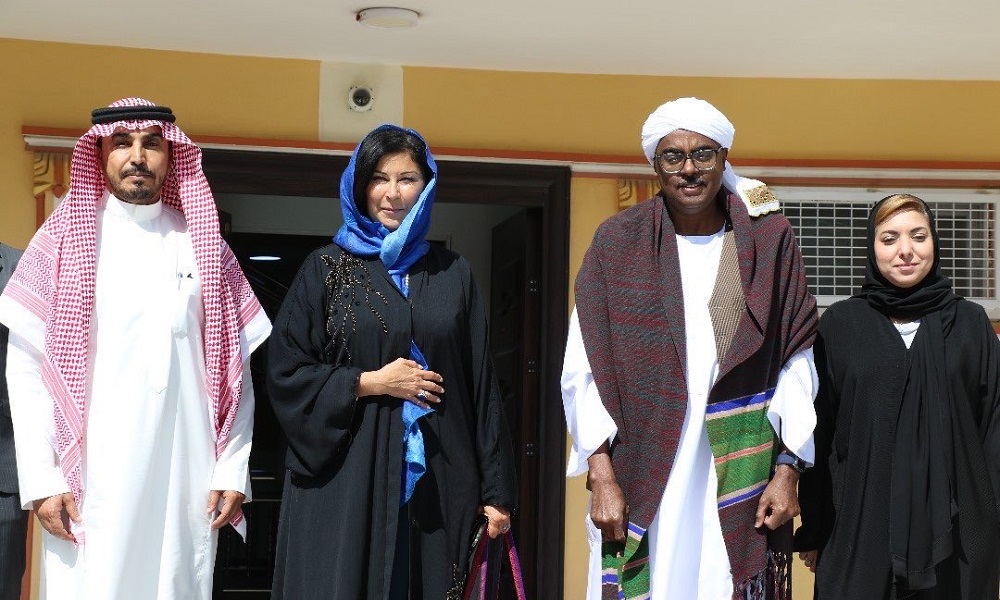
EU Chargé d’affaires in Afghanistan Raffaella Iodice met Tariq Ali Bakheet, OIC’s Assistant Secretary-General for Humanitarian, Cultural, Family and Social Affairs and special envoy for Afghanistan, and his accompanying delegation in Kabul, it was announced Tuesday.
Iodice said on X that they discussed the humanitarian and economic situation in Afghanistan as well as the right to education.
“Principled support for the sake of the people remains key,” she said. “Female voices need to be part of any dialogue and constructive engagement in Afghanistan.”
Earlier, the OIC delegation met with the officials of the Islamic Emirate.
-

 Business4 days ago
Business4 days agoCommerce ministry inks 10 MoUs to boost development of small and medium-sized businesses
-

 Sport4 days ago
Sport4 days agoRashid Khan threatens BBL pullout after Australia postpones Afghanistan T20I series
-

 Latest News4 days ago
Latest News4 days agoOver 6,000 acres of land cleared of poppies in Badakhshan
-

 Health5 days ago
Health5 days agoBalkh health officials report sharp increase in number of cancer patients
-

 Latest News4 days ago
Latest News4 days agoMSF ‘deeply concerned’ over new phase of deportations of Afghans from Pakistan
-

 Sport3 days ago
Sport3 days agoAfghanistan Champions League kicks off with grand opening ceremony
-

 Latest News2 days ago
Latest News2 days agoPakistan’s frontiers minister stresses ‘dignified’ return of Afghan refugees
-

 Regional3 days ago
Regional3 days agoIran’s foreign minister downplays drone attack, says Tehran investigating

